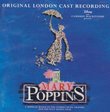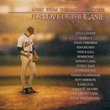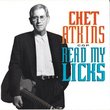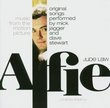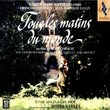| All Artists: John Williams Title: Minority Report [Original Motion Picture Score] Members Wishing: 1 Total Copies: 0 Label: Dreamworks Original Release Date: 6/21/2002 Re-Release Date: 6/18/2002 Album Type: Soundtrack Genres: Pop, Soundtracks Style: Number of Discs: 1 SwapaCD Credits: 1 UPCs: 600445038523, 0600445038523 |
Search - John Williams :: Minority Report [Original Motion Picture Score]
![Minority Report [Original Motion Picture Score]](https://nationalbookswap.com/cd//l/81/4581/594581.jpg) | John Williams Minority Report [Original Motion Picture Score] Genres: Pop, Soundtracks
While Steven Spielberg's sci-fi detective thriller revolves around the intriguing premise of future cops arresting criminals before their crimes, beneath its high-tech veneer it asks a simple but infinitely powerful questi... more » |
Larger Image |
CD DetailsSynopsis
Amazon.com While Steven Spielberg's sci-fi detective thriller revolves around the intriguing premise of future cops arresting criminals before their crimes, beneath its high-tech veneer it asks a simple but infinitely powerful question: Do we have the power to alter our own destiny? Coming on the heels of the director's posthumous collaboration with Stanley Kubrick, A.I. Artificial Intelligence, it also affords longtime Spielberg musical collaborator John Williams a rare back-to-back opportunity to construct a musical future-world. The composer's efforts here are largely a forceful departure from A.I.'s sparkling minimalist influences, employing an enduring cinematic cliché--that film futures often sound much like the works of early-20th-century serialist/modernist classical composers--that puts a compelling new spin on the ever slippery concept of postmodernism. If the cues here occasionally recall the jagged edges, dark corners, and rhythmic fury of some of Goldsmith's best sci-fi scores, it's only a tribute to both legends' deep musical roots and preternatural scoring instincts. But make no mistake, this is pure Williams at his most compelling, employing his full arsenal of technique and always masterful use of color to construct a new genre--call it "future noir"--from inspirations as diverse as Bartók, Ligeti, Penderecki, Webern, and Schoenberg. Like Herrmann's suspenseful scores for Hitchcock (one of the film's intentional musical touchstones), there may be nary a memorable melody in it, but it's a riveting--and occasionally harrowing--listen from opening bars to its final, minimalist-tinged string flourishes. --Jerry McCulley Similarly Requested CDs
|
CD ReviewsGreat Score Combined with Classical Hits Enrique Sanchez | Miami, FL | 07/03/2002 (5 out of 5 stars) "Before I begin, I must mention that Williams did incorporate some Classical Music from other composers into this score. He did use the 1st movement of Franz Schubert's very famous "Unfinished Symphony" as the backdrop for the moments when Tom Cruise's character was in the "Pre-Crime computer". That is, where he sees the flashes of images and tries to put them together with his hands from the Pre-Cogs' inputs as if playing the Theremin. Williams also used some slow movements from a Peter Ilyich Tchaikovsky symphony and snatches of another Romantic era composer I can't recall at this moment - perhaps Robert Schumann.All that aside, Williams has served his craft well again with a marvelous and evocative score. Williams is maturing finally and has demonstrated that he will not be a servant to "Sound-bite Tunes" or "Signature Tunes" to each movie - merely to add cohesion as in the symphonic fabric of a full-length classical work. These are simply not always necessary. The best music, it has been said before, it that which you do not hear while you are watching a movie. Perhaps Williams has finally taken note and just scored the movie as it should be....a collection of actions and feelings..and not just Top 40 hits bundled up into an orchestral framework.Bravo John!" John Williams and his A-grade "Report" Brandon Galvin | Kansas City, MO USA | 06/30/2002 (4 out of 5 stars) "One of the most exciting things for many movie-music lovers is getting their hands on the next John Williams soundtrack. I myself have been a great fan of his scores. He writes such beautiful and grand themes, heartbreaking melodies, and pulse-pounding action music that it seems never to stop. For over 30 years, he has poured out scores, one after another, and each one is bold, beautiful and exciting. My recent favorites of his have been "The Phantom Menace", "Harry Potter and the Sorceror's Stone", "The Patriot", "Attack of the Clones", and "A.I." And now there is another to add to that list: his newest collaboration with director Steven Spielberg, "Minority Report".Recently, Williams has been branching off, and covering new ground for himself, while also reminding listeners of his previous efforts. That is the magic of John Williams's music: You know when you're listening to him. I was highly anticipating the score for "Minority Report", while at the same time, I was fearful. After all, this man has produced scores to dozens upon dozens of films. After after the recent successes "A.I." and "Attack of the Clones", I wondered: Could he still do it?The answer is yes. With the score for "Minority Report", I found something very different than what I expected, and yet something that thrilled me at the same time. This is a much harder-edged film, which calls for a much harder score. There aren't many of the soaring melodies that Williams is known for here. Instead there is some very Bernard Herrmann-like suspsense chords, haunting vocals, and some very futuristic-sounding tones. And if this sounds like a major step in the wrong direction to fans of the old John Williams, then you'd be wrong. There are his trademark beautiful melodies and incredible action cues that remind you who you are listening to, while at the same time not boring you in the least. The first track, "Minority Report", starts off with dark, suspenseful rhythms and builds to some very intense action music before fading into the first use of the major theme. "Spyders" is another tense Herrmann-esque cue, that is very suspenseful. "Sean's Theme" is the heart of the soundtrack, and is a soft, bittersweet piano theme that aches with loss and love. Although it is short, it is very good. "Visions of Anne Lively" is a haunting track that utilizes eerie vocals and a dissonant, futuristic sound. The most exciting track in the score accompanies the most exhilirating sequence, "Anderton's Great Escape"--a fast, thunderous action piece. John Williams definintely let loose in this particular sequence, and this complex and exciting track is one of the score's highlights. Another personal favorite of mine is the last track, "A New Beginning". Much like the beautiful theme for "A.I", John Williams allows the theme to build throughout the film before finally letting it flourish in the end. It is a simple and beautiful melody that finds its way into your heart and mind, and stays there.The rest of the tracks are also quite good, although "Minority Report", "Sean's Theme", "Anderton's Great Escape", and "A New Beginning" are enough to make you buy it.So, all in all, the score to "Minority Report" is a success. While it may not be remembered as well as "Star Wars", "Indiana Jones", and "Jaws", it will no doubt please fans of John Williams and film music. It is a score that is different, and yet somehow familiar, and that's why it is such a pleasure to listen to." Exceptional work by williams (as usual) Travis Eickman | Dallas, TX USA | 03/31/2003 (4 out of 5 stars) "ok, for mr. dvdowner who gave this soundtrack one star and said its Williams worst work, i have something to say. First off, this film (Minority Report) is a work of art by Spielburg. Yes, it is dark, mr. "dvdowner" is too wimpy to handle it. Second, its dark for a reason. Spielburg is flat out, asking us if this is how we want to be living in fifty years, because thats the track our country is headed in. Thirdly, William's music fits perfectly, he doesn't always have to have trumpets and loud brass in a major key for every album, especially this one. Track #9, "Sean's Theme" is incredible! In my opinion, Williams has never had a bad recording, and never will, especially if you compare him to other musicians. So, mr. dvdowner, whoever you are, think before you embarrass yourself by stating something you don't understand, and something no one else agrees with. THANK YOU."
|

 Track Listings (16) - Disc #1
Track Listings (16) - Disc #1


